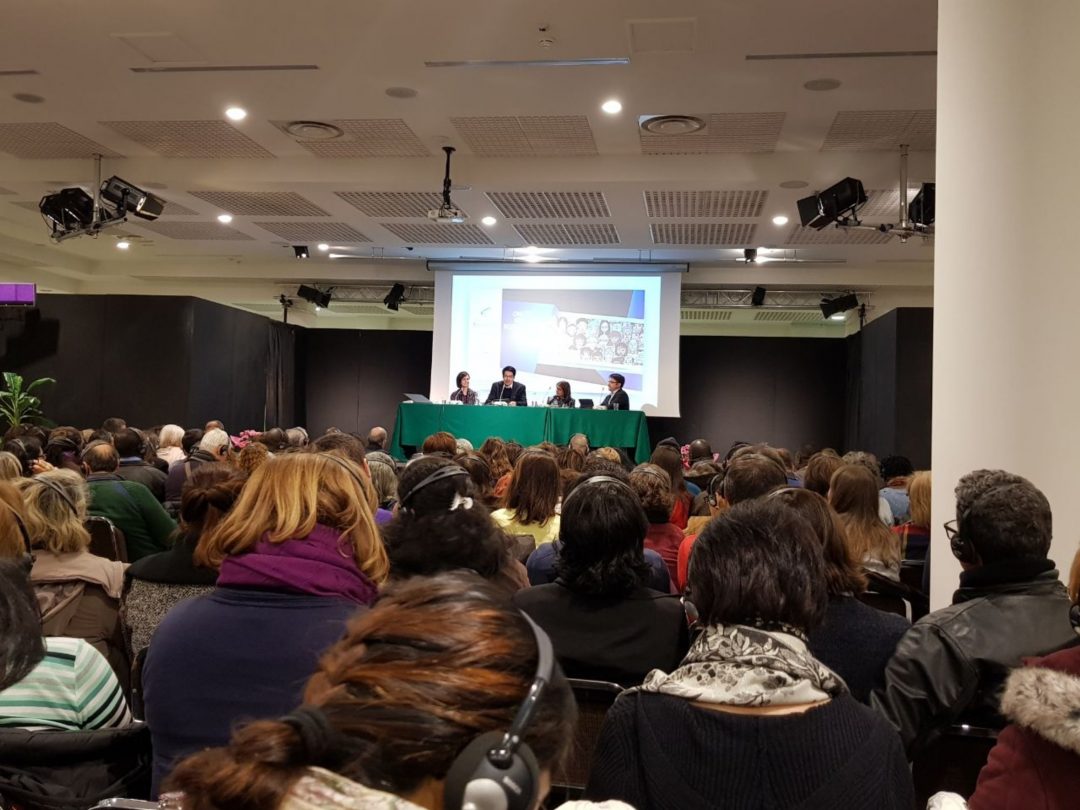This was the talk that Lawrence Chong, CEO of Consulus delivered at the New Humanity School in Rome on the 28th of February 2018 before an international group of leaders and professionals of different vocations who work for unity throughout the world.
The event was part of the 10th anniversary celebration to remember the life of Chiara Lubich, a global leader of unity and dialogue who passed away in 2008. It gave us an opportunity to thank her for her inspiration.
Thank you Paolo for the kind introduction and for inviting me. I feel that I can speak freely because I am with family. As Paolo mentioned earlier, I serve in a global innovation firm called Consulus which in Latin, means “with others”. Today, I like to share our transformation experience in three areas: Companies, the consulting industry and smart cities.
Our core work is to help clients prepare for a new type of economy that the World Economic Forum has dubbed the Fourth Industrial Revolution. We believe this will require designing new frameworks of unity in society, economy and business that will be relevant for the future to work for all of us.
Transforming Companies
A few years ago, Forbes Magazine published this statistic: a successful company would have lasted an average of 67 years in the 1920s but now would probably average about 15 years. A very obvious example would be YAHOO which was a very successful internet company until it fizzled out and nearly could not find a buyer until last year.
So while human life expectancy has gone up due to eating better and improved exercise habits, corporate life expectancy has actually gone down. This is not surprising for anyone working in corporate transformation because while business climate has changed dramatically in the last decade, the habits and practices of many companies remained largely the same. Companies still treat staff as a resource hence the department is called human resource. Many companies still think that producing more is good when increasingly the future is shaped by creativity through using fewer resources, not more. In sum, many companies are sleep-walking themselves into death.
What we learned in transforming large and small companies for 14 years is: unless companies are prepared to rediscover their purpose and redefine relationships, they will not be able to meet the challenges of the new world. In a way, Chiara Lubich who launched the New Humanity movement was prophetic when she explained how a new type of company can emerge when she said this in 1984 and I quote:
“every person in the working world (from the owner to the administrator, from the director to the technicians, from office workers to laborers) in order to build solidarity with others, must love everyone in such a way that he or she becomes ‘one’ with the others.
In this spirituality, mutual love leads to reciprocal understanding, to sharing the fatigue of the others, to make our own the problems of the others and to seek solutions together. It leads us to find common agreements for new forms of organizations in the working world. All come to share and participate together in the means of production, and in the fruits and profits.” end quote
At this point, I must declare that the transformation methodologies of Consulus are deeply influenced by the foundational thoughts of Chiara Lubich. Back to what Chiara said that a new form of organization can only come about when everyone loves the value and contribution of each other.
In 2016, Google published an organisational study about what makes the perfect team after analysing its teams using data. Google concluded that the best teams are not because the team players are drawn from the best universities or given the best resources. It is those teams that can best create a psychologically-safe environment that respects each person, his or her contribution, enabling a comfortable exchange of ideas which then unleashes the best innovation or performance.This absolutely endorsed and proved that what Chiara said in 1984 is true.
Since we have already subscribed to Chiara’s thinking since 2004, it has been our modus operandi to use this approach whenever we help companies reinvent themselves. First, we conduct a 360 study to help them discover their existential purpose and the importance of the relationships internally. Then we work with them to redesign their business and organisational model to enable a new type of unity. This will then strengthen psychological safety which in turn, unleash innovation and business performance.
In a workshop which our team in Brazil conducted for a major bank there, the head of department shared this after the exercise and I quote:
“The UNIFY workshop helped us build trust, something I’ve been trying to do with my team for some time. It helped them to be more receptive to criticisms and suggestions for improvement as well as to sincerely say what they think for the benefit of individual growth and the institution. In addition, the workshop introduced to us a new methodology for innovation, which aims to strengthen relationships, gather people and bring out the best of each member.”
Transforming the consulting industry
The global consultancy business likes to talk about providing change solutions for the clients but rarely likes to talk about changing itself. Because it is still very much an old boys club, serving entrenched interests. The recent fall of President Zuma in South Africa has implicated firms such as McKinsey, KPMG who have helped to further the interests of the few. When we started the firm, we were inspired by the principles of the Economy of Communion and we wanted to contribute in a concrete way to shape a new economic system. So for us, that meant changing the way the consultancy business as a model works by creating a new one.
First of all, in the consultancy business, there is a class system among the disciplines. If you are in finance, you are right at the top but if you are in a discipline that is say design, you are in a rank that is lower. So we worked hard to create a new methodology where the contribution of diverse disciplines from finance to design would be equally respected. The other problem in the consulting business is excessive internal competition that at times seem to favour sales solutions at the expense of clients. So we strive to build a community-type of environment to reduce internal competition to focus on holistic and sustainable solutions for clients. We give priority to sharing ideas, effort and we have a one-office mentality which means that no country office will be competing with each other but instead will always be dependent on one another. As a global community of 60 consultants who come from 14 nationalities and speak 15 languages, this is an incredible advantage. Here is a sharing by a consultant about the Consulus experience:
“I see Consulus as a consultancy company that wish to go beyond the superficial branding of a fancy name or tagline with insincere gestures of change for economic profit. Consulus wants every transformation to come from within, a sincerity that reveals itself from inside out. It asks of it not just from its clients, but from its employees and partners as well.
That requires a change in mentality from top management to the bottom from the corporations Consulus work with and for the Consulus team to have the faith that this would have the ripple effect to eventually change the world, one corporation at a time. If every corporation follows the same transformation, it might bring out the true meaning of a corporation with a soul.”
Transforming the development of future cities
By 2050, 66 percent of the world’s population will be in cities. There has been a lot of conversation about smart cities and infrastructure but little about managing diversity and navigating the tensions that are emerging. So in 2016, together with an Asian development partner, we launched a people-centered solution call PlaceCORE. Where we implement strategies for smart townships or cities that are purpose and people-oriented with technology and infrastructure at its service and not as its goals.
We have been working on a prototype smart township in Sarawak of Malaysia for almost three years. Before we began the project, instead of imposing a model, we decided to launch a story contest. Its aim was to gather from the people their reflections of living there and their aspirations. What began as a humble project of listening to the people became a multi-year project which engaged 20,000 people which unleashed creativity and passion for the state. Through hundreds of submission of stories and artwork, the thoughts of the people began to shape this township project which united the people to come together to do something inspiring.
One project participant said and I quote:
“I rarely does a developer talk about a higher purpose but here in this project, it is not just about commercial value but something priceless, it is about achieving something greater together with meaning and purpose.”
From our own experience as a consulting community and our work for companies and cities, we have discovered this truth. That once you are able to create conditions for unity around a shared purpose, something extraordinary takes place. And one sign of this new unity is that it will go beyond transactions towards something greater. It transfigures relationships and approaches, this then generates creativity and innovation. So it is true when Chiara Lubich said that unity is the sign of our times. Or actually, we should say, unity is the sign of an organisation or society that has a future. Without unity, nothing will grow. But with unity, a new hope will take hold, ideas will flourish and a new world will unfold. Thank you.




